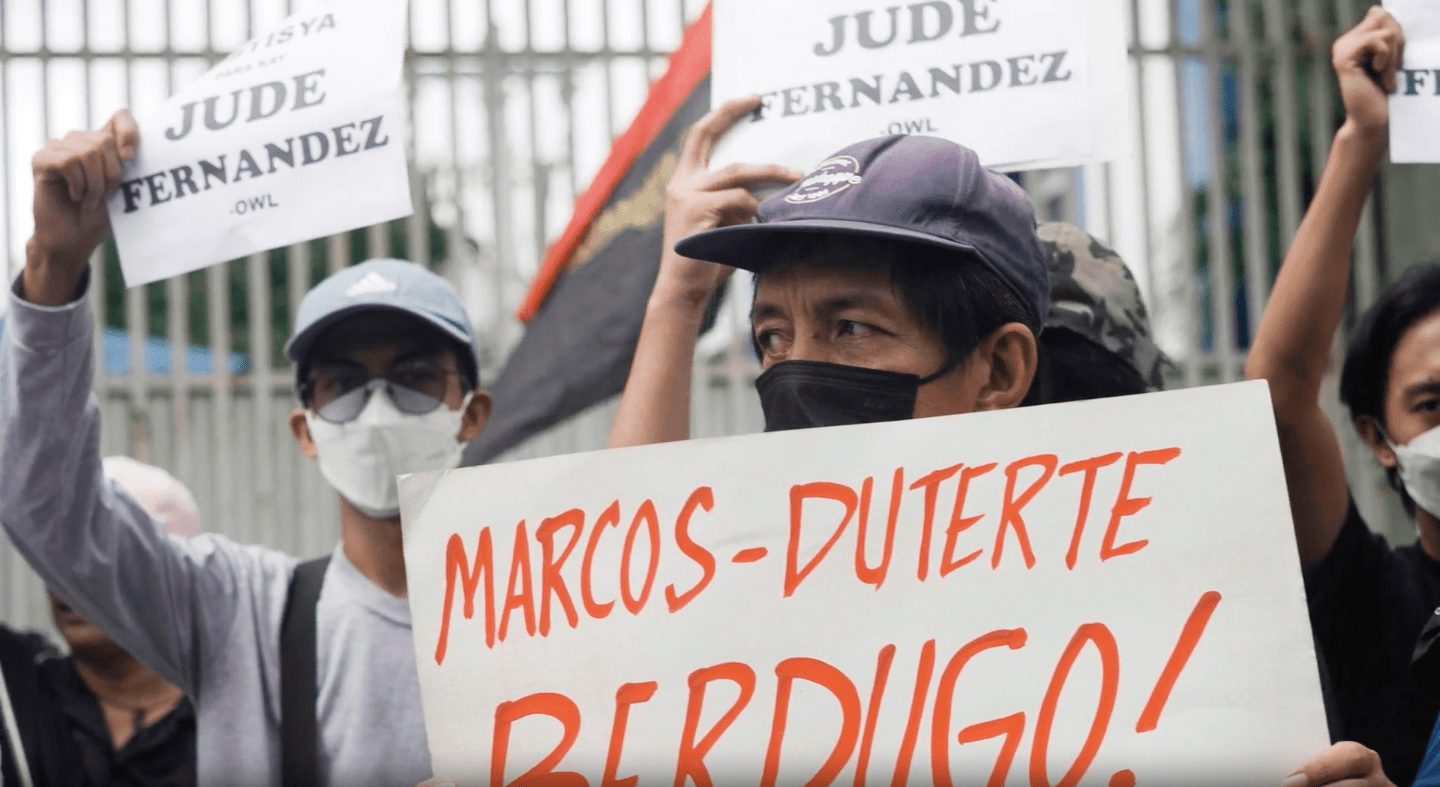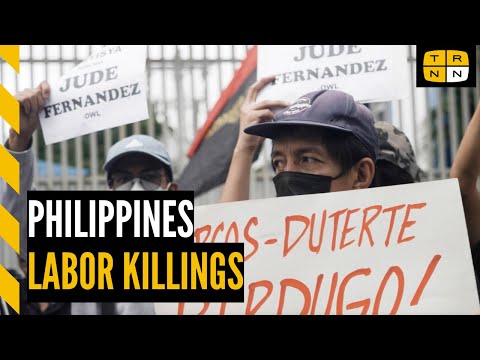On Sept 29, union leader Jude Thaddeus Fernandez was killed in his home by Philippine National Police during a labor campaign to raise wages and end government corruption and abuses. Fernandez is the 72nd victim of labor-related killings in the Philippines since July 2016. The Real News reports from Manila.
Producer: Mayday Multimedia, Brian Sulicipan
Videographers: Aly Suico, Bane Vicente, Francis Manaog, Kat Catalan, Tel Delvo
Video Editor: Mervine Aquino
Narrator: Kate Calimag
Transcript
Jerome Adonis, Secretary General, Kilusang Mayo Uno (KMU): Our call: Justice for Comrade Jude!
Justice for Comrade Jude!
Justice for all the victims of political killings!
Kate Calimag (narrator): Filipino workers, led by Kilusang Mayo Uno (May First Movement), protested in front of the National Police Headquarters in Manila to condemn the killing of veteran labor organizer Jude Fernandez, who was slain on September 29, 2023.
As reported by various labor groups in the country, Fernandez is the 72nd labor organizer killed since 2016. The incident comes despite promises by the Marcos Jr. administration to ensure labor and human rights in the country are respected.
Rafael Provido, Ilaw at Buklod ng Manggagawa (IBM) – KMU: Join the struggle!
“Don’t be afraid!”
Don’t be afraid!
“Join the struggle!”
Kate Calimag (narrator): As a veteran activist and labor organizer who started in the ’70s, during Ferdinand Marcos Sr.’s Martial Law, the death of Fernandez sparked protests and statements of condemnation from other sectors as well.
The protesters also noted how reminiscent the brutal death was of the activist suppression during the Martial Law years.
Mong Palatino, Bagong Alyansang Makabayan (Bayan): Justice for Comrade Jude!
Justice for all victims of extrajudicial killings!
Justice for all victims of the state’s terrorism!
Kate Calimag (narrator): Fernandez was known to have been crucial in forming the Alliance of Workers in the Province of Laguna, and labor federation Unity of Workers in Southern Tagalog – KMU. Both labor formations are based in the provinces south of the Philippine capital which have dense populations of workers employed by various multinational companies.
Jerome Adonis, Secretary-General, Kilusang Mayo Uno (KMU): Since starting out as a youth activist, Fernandez immediately decided to help in labor organizing. They formed various formations to broaden the struggle and fight of workers, mainly on issues regarding the living wage. Second, on resisting contractualization (labor flexibilization schemes), third on the issue of decent and safe workplaces. Lastly, the fundamental right of workers, to organize and form a union.
Kate Calimag (narrator): Various labor and human rights organizations launched a factfinding mission led by Kilusang Mayo Uno.
Based on interviews in the community, a group of operatives in plainclothes executed Jude Fernandez. While police reported that the 66-year-old labor organizer fought back, anonymous community members said that there was no exchange of gunshots. The “nanlaban” narrative, or victims allegedly having “fought back,” is eerily similar to the preceding administration’s executions of drug suspects which have been criticized globally for violating human rights.
Because of the mounting number of labor-related harassments, red-tagging, and deaths, various labor groups united to denounce the worsening climate for labor organizing in the country. The labor groups submitted a unified report to the International Labour Organization, which has since given recommendations to the Philippine government.
Since the ILO mission, four labor-related deaths, including Fernandez’s, have been recorded.
Kamz Deligente, Deputy Director, Center for Trade Union and Human Rights (CTUHR): In other cases, labor organizers Ador (Juat) and Loi (Magbanua) have been missing since May 2022. After them, there have been four more cases of extrajudicial killings of workers and organizers. There’s the murder of Alex Dolorosa of BIEN (BPO Industry Employees Network) in Negros Province and the killing of the Fausto family, who were agricultural workers.
It’s still very difficult to organize unions, workers’ organizations or associations. Actually, same goes for any kind of organization, right? It’s difficult because of the continuing and worsening repression and attacks against those who seek change.
We need to address concerns on the right to organize. The Philippines remains in the top 10 most dangerous or worst countries for workers, primarily because of these reasons. Violence, harassment, and other forms of attacks against workers are prevalent. With this recent case of the brutal killing of Jude Fernandez, we see that the Philippine government is not serious in keeping with the image it tries to show the international community, that it is “pro-human rights” that it is supposedly serious in enacting “change.” But we see that it remains much of the same.
Kate Calimag (narrator): The Center for Trade Union and Human Rights cites informal and formal barriers that cause the shrinking unionization rate in the country. Such formal barriers include government policies on labor flexibilization and anti-insurgency. While labor flexibilization policies have been around since the ’80s, new anti-insurgency policies affecting labor, specifically the NTF-ELCAC (National Task Force to End Local Communist Conflict) and the Anti-Terror Law were enacted during the Duterte administration and continued to the current Marcos Jr. administration.
Jerome Adonis, Secretary-General, Kilusang Mayo Uno (KMU): State and capitalist agents target labor leaders and organizers, like those from KMU, because we are known to fight not only for wages, jobs, rights, but also for political change in the future. Because we believe that even if we get wage increases, we form unions, if the government’s repressive policies remain, it will all be for nothing.
Kate Calimag (narrator): While KMU has vowed to bring justice to the slain labor organizer, various labor groups and student organizations spoke in support and solidarity with Fernandez’s family and fellow organizers.
“The traces you left, we will follow”
“We will rise firmly from where you departed”
“For the traces you left, we will follow”
Kate Calimag (narrator): Fernandez’s remains were welcomed in a church inside the University of the Philippines. A tribute was held to commemorate his contributions to the Philippine labor movement and the national democratic movement.
“…Forge the path!”
“Five workers, add to them ten,”
“When they struggled, grew to fifty”
“Workers, whose hearts are one…”
“Sorrow not, motherland,”
“even if some of your children fall”
“Our fortress of steel shelters us”
“…In our struggle, we will succeed.”
Mario Fernandez, President, OLALIA – KMU: The state seems to think, specifically the NTF-ELCAC, that when they jail, kill, and harass labor organizers, maybe we would stop. But it’s the opposite especially because of the economic crisis, the higher inflation rate. That’s what they fail to see. They only know how to harass us, thinking it would stop us. That’s not normal. That is not the reality. This urges us to press on. Even if they jail and kill older labor organizers, we will not stop. Instead, it only pushes us more to take to the streets and continue the fight.
Lito Ustarez, Kilusang Mayo Uno (KMU): Long live Comrade Jude!
Long live his memory!
We will carry on until victory!
“The Internationale becomes all humanity!”
“The working class!”
“The army of liberation!”
“The army of liberation!”
“The working class!”




